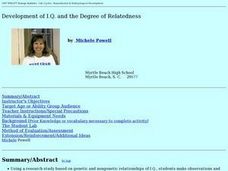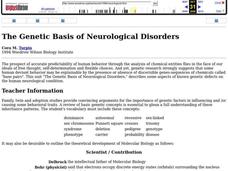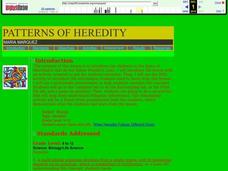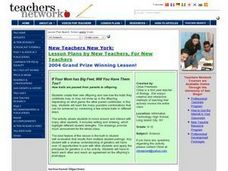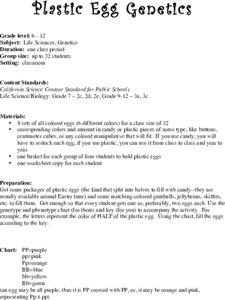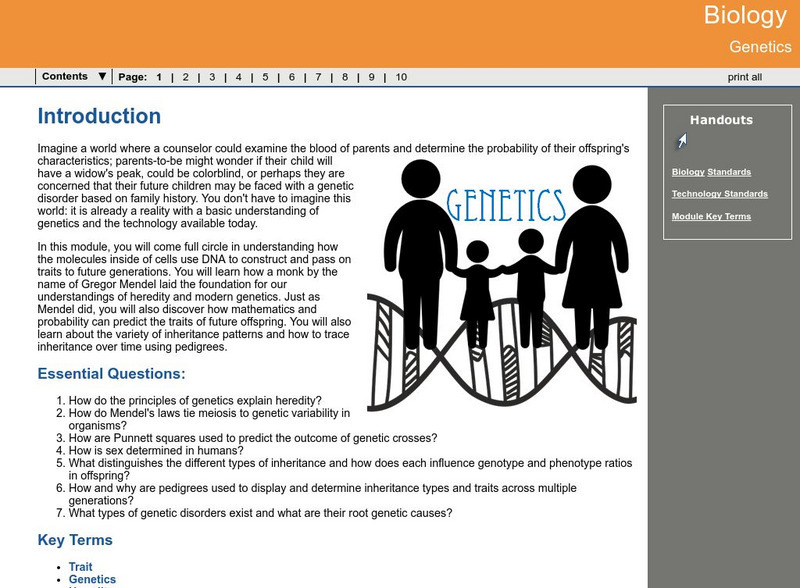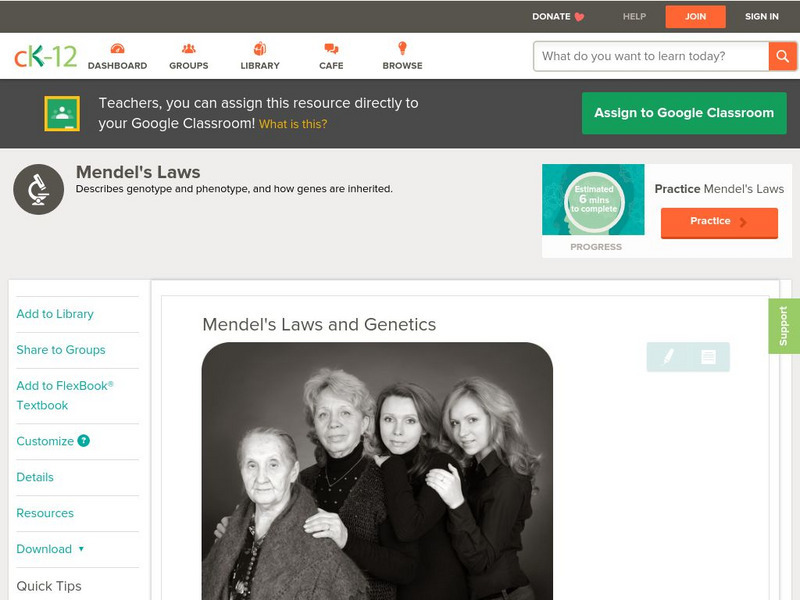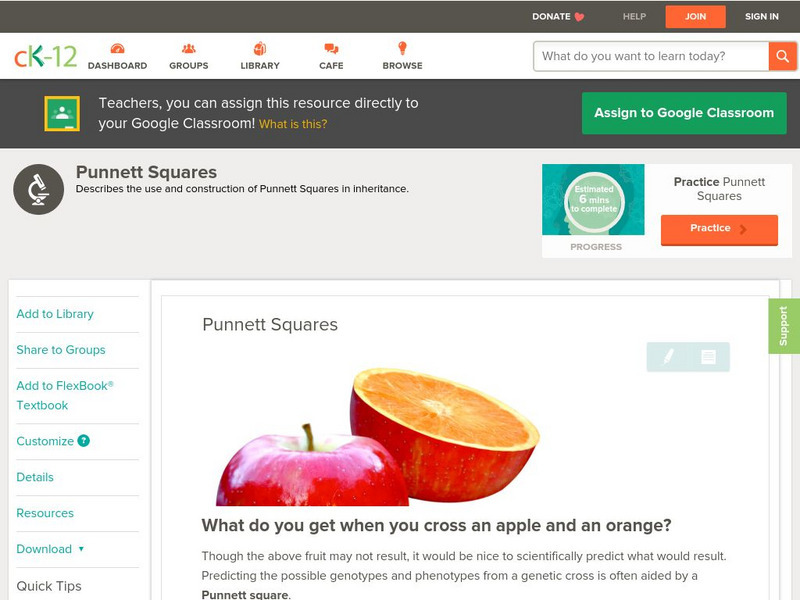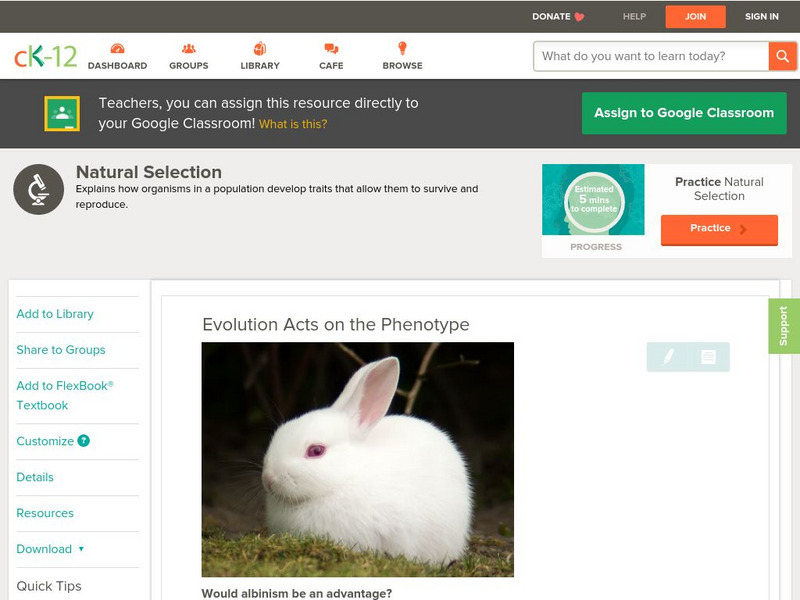Curated OER
Development of I.Q. and the Degree of Relatedness
Studnets, in groups, analyze data regarding genetic and nongenetic relationships of I.Q. They make observations and discuss correlations from a diagram. Cooperative learning teams discuss a given set of questions and present information...
Curated OER
Characterization of the Bioluminescence (Lux+) Gene E. coli
Students grow E. coli strain HB101, which contains the plasmid pUCD607 with the bioluminescence (Lux+) gene. The plasmid containing the Lux+ gene is isolated from the E. coli, then characterized by restriction analysis.
University of Georgia
Monohybrid Crosses and The Punnett Square Lesson Plan
Looking for a quick, hands-on activity to teach young scientists about Punnett squares through monohybrid crosses? then check out this one.
Curated OER
The Genetic Basis of Neurological Disorders
Young scholars explore neurological disorders. They examine the presence and absence of discernible genes. Students describe neruological diseases and draw faces of affected persons. They play a human neurology disorders learning game.
Curated OER
Heredity (Mendelian Genetics)
Students observe and record observations of whether a person is a taster or nontaster. They test selected individuals from their families and peer groups and chart all findings to determine which trait (e.g. taster or non-taster) is...
Curated OER
The Case of Regulation in Cells
After your biologists have learned about transcription, translation, and gene regulation, they work in a small group to create a poster of a system that serves as an analogy of the gene regulation process. They share their creations with...
Curated OER
Problem Solving in Genetic Disorders
A class of older and academically mature students are divided into pairs, usually one male and one female and are told that they are expecting a child. Unfortunately, their child may or may not have inherited some form of genetic...
Curated OER
Family Pedigrees
Students work as a class to first construct a pedigree of a popular singer, showcasing the singing gene being passed down through the generations. Students then make their own family pedigree and follow two traits through their family...
Curated OER
Genetics of Parenthood
Learners participate in an activity where they flip coins to determine which allele they pass on to the F1 generation and draw the resulting child's face. They identify several inheritance patterns including dominant, recessive,...
Curated OER
Patterns of Heredity
High schoolers describe the differences between incomplete dominance and codominant alleles, and between multiple alleles and polygenic inheritance. They describe how internal and external environments affect gene expression. They then...
Curated OER
Mendel Pea Plants
In this Mendelian genetics learning exercise, students answer a variety of questions about Mendel's experiments and discoveries and they practice determining probability of outcomes in pea plants.
Curated OER
If Your Mom Has Big Feet, Will You Have Them Too?
Pupils describe and apply the Mendellian principles of genetics, focusing predominantly on dominant and recessive genes. They demonstrate how two parents contribute genes and how those genes appear in their offspring. They describe...
Curated OER
"Chips" Off the Old Block?
Students study using analogies between common items or occurrences and science concepts. They use the analogy of cookie recipes to that of the DNA "recipes" for living things to help us explain more about mutations.
Curated OER
The Genetic Basis of Neurological Disorders
Students describe some aspects of known genetic defects on the human neurological condition. They participate in a variety of exercises including drawings, games, and analogies.
Curated OER
Modeling a Gene Pool
In this genetic activity, students examine how gene frequency changes in a population of organisms. After completing 5 pre-lab questions, they work in pairs to collect data and answer 5 additional post-lab questions.
Curated OER
Plastic Egg Genetics
Students are introduced to the concepts of genetic dominance, recessiveness, related terms, Punnett Squares, etc.
Curated OER
Human Genetics
This is a worksheet regarding human genetics where students can poll the class regarding specific traits.
Georgia Department of Education
Ga Virtual Learning: Biology: Genetics
Through informational text, interactive activities, practice problems, and video clips, students analyze how biological traits are passed on to successive generations.
CK-12 Foundation
Ck 12: Biology: Mendel's Laws and Genetics
[Free Registration/Login may be required to access all resource tools.] Describes genotype and phenotype, and how genes are inherited.
CK-12 Foundation
Ck 12: Biology: Mendel's Laws and Genetics
[Free Registration/Login may be required to access all resource tools.] Describes genotype and phenotype, and how genes are inherited.
Biology Corner
Biology Corner: Pipe Cleaner Babies
Using chromosome and gene models, students play the roles of two parents in this genetics simulation. The object is to create four offspring and determine their genotypes and phenotypes, and determine the probability of having offspring...
Khan Academy
Khan Academy: The Law of Segregation
Resource provides a discussion of Mendel's law of segregation with a focus on genotype, phenotype, alleles, heterozygous/homozygous, and 2 x 2 Punnett squares.
CK-12 Foundation
Ck 12: Biology: Punnett Squares
[Free Registration/Login may be required to access all resource tools.] Describes how to use a Punnett square to predict genotypes and phenotypes.
CK-12 Foundation
Ck 12: Life Science: Evolution Acts on the Phenotype
[Free Registration/Login may be required to access all resource tools.] Natural selection acts on the phenotype (traits or characteristics) of an individual. On the other hand, natural selection does not act on the underlying genotype...
